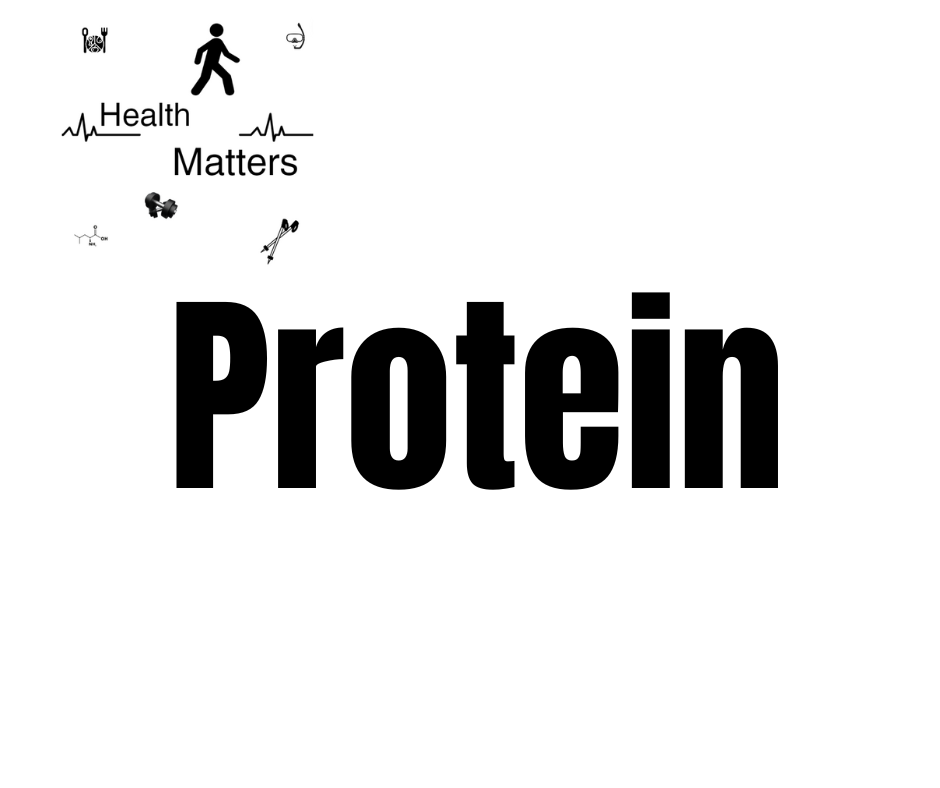Protein
Protein as defined in the Merriam-Webster dictionary as: “any of various naturally occurring extremely complex substances that consist of amino-acid residues joined by peptide bonds, contain the elements carbon, hydrogen, nitrogen, oxygen, usually sulfur, and occasionally other elements (such as phosphorus or iron), and include many essential biological compounds (such as enzymes, hormones, or antibodies)”.
When I looked up this definition I was pleasantly surprised that the dictionary did not mention “muscle”. When the topic of dietary protein is brought up, building muscle seems to be a major theme.
Certainly proteins are a major component of our muscle tissue, however proteins make up so many more structures and serve many different functions. Dietary protein intake provides for us the building blocks to make proteins as well as protein like structures such as “peptide hormones”.
Insulin is often thought of as a protein but it is classified as a peptide. Peptides can be thought of in much the same way as proteins – just generally shorter chains of the same building blocks. For the sake of my discussions I will not make a distinction between proteins and other protein like substances such as peptide hormones. The biochemistry of insulin serves as a good example of the different roles of proteins in our body. Click here for a quick summary of this biochemistry and links to more in depth descriptions.
There are many other hormones that are formed from the building blocks of proteins. We are constantly making and breaking down all of these hormones. Our hormonal (endocrine) system relies on us eating adequate amounts of protein so we have enough of the right building blocks to make these hormones.
Proteins are essential to the functioning of our immune system. Antibodies are a key part of our immune system. Antibodies are fairly large, very complex protein structures (glycoproteins). We have an extraordinarily diverse set of antibodies. Through a fascinating set of steps we produce and regulate these antibodies. The process of antibody production and regulation of course involves a tremendous number of other proteins. We have an abundant amount of smaller proteins that act as messengers in our immune system called cytokines. We must be ready to produce cytokines the moment our body needs them to up regulate our system to control an infection, or down regulate parts of the system.
Another group of lesser known small proteins is the “complement system”. This group of 50 or so different proteins are activated and otherwise regulated by many other proteins. We are constantly making these immune system proteins to keep up with the natural turnover of these proteins.
The parts of our immune system that is referred to as “cellular immunity” depends much on the efficient production of proteins. We must be ready to quickly make squadrons of for example T Cells that are specific to a part of a virus or other invader. Cells of the immune system have a dizzying array of specific cell surface proteins that must be made to interact with other cells and components of the immune system as well as recognize the infection.
Skin is another protein rich complex system that is part of our ability to protect us. In the next article I will continue talking about the proteins that make up the structural components of our bodies. Click here if you are ready to read that article. I will also in a few days be posting this article on Facebook and sending it out to subscribers. Interested in learning a little bit more about the immune system – check out this article.
Subscribe to our newsletter!
Note the subscription feature may not be currently functioning. Please send me an email through the contact form to be added to a subscribers list.
Russ

Pingback: The Grand Canyon and Goals – Health Matters